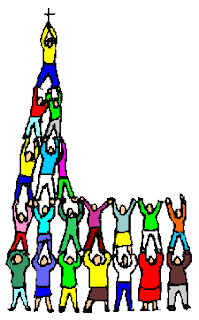 |
| Disaster! National collapse! Hardly. These are the common social fluctuations occasioned by economic variations. We adapt to the opportunities available. |
Or maybe it's the end of the world!
Nonsense.
Welcome to the 21st century. The phenomenon is called the 'accordion family' and 'boomerang children'. It has happened before and will likely happen again. As the economy loosens or tightens, folks in transition may or may not find an adequate place in the workforce right away. They may or may not be hired into a viable career path right out of school. They may launch in the classic (1950's) sense, or they may emerge more slowly like youngsters did in the 1930's. Let's not struggle with social contextual issues as though they were a simple choice. Stuff like that happens.Going a bit further, it's worth noting that the economically tight times will first affect young folks, single-income homes, recent immigrants, and perhaps non-technical folks. If extended, the economic impact will envelope the entire population. It's done to us, not by us.
 |
| Stay connected. Stay informed. Stay involved. |
Take a breath, get a grip, adjust.
Fuss, pray, fight, pray, work, push, pray, change, vote :), be thankful for the opportunity you have.












